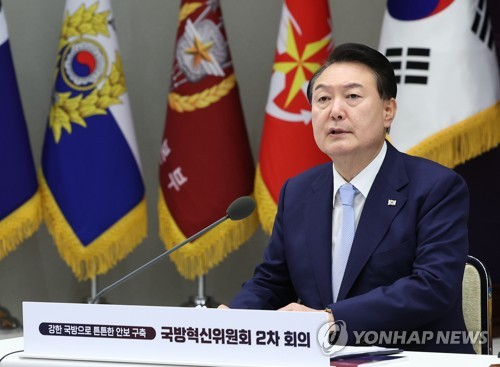Energy has been among the key pillars of Qatar and South Korea’s diplomatic ties of almost 50 years.
South Korea’s President Yoon Suk Yeol is scheduled to visit Qatar and Saudi Arabia between 21-26 October to discuss the developments in Gaza and joint economic cooperation, Seoul’s Yonhap news agency reported on Thursday.
Principal Deputy National Security Adviser Kim Tae-hyo said the South Korean president’s five-day regional tour will kickstart in Saudi Arabia, where he plans on meeting Saudi Crown Prince Mohammed bin Salman Al Saud.
President Yoon will then visit Qatar between 24-25 October, where he will meet Qatar’s Amir Sheikh Tamim bin Hamad Al Thani.
The South Korean leader’s visit is set to become the first to pay a state visit to both countries, Yonhap reported.
“As Saudi Arabia and Qatar are two of our main trading partners in the Middle East, and key players in regional politics and the regional economy, friendly cooperation with these nations is essential to our economy and national security,” Kim told a press briefing, as quoted by Yonhap.
The Korean official noted that the trip will “reinforce” Seoul’s relations with both Gulf states while exploring “new areas of cooperation.”
“Now, our partnership with the Middle Eastern region will go beyond energy and construction to a new stage that encompasses hydrogen, IT, autos, shipbuilding, renewable energy, culture, entertainment and other future industry sectors,” Kim added.
The visit comes amid the ongoing Israeli aggression on Gaza that has only escalated since 7 October with no ceasefire in sight. Since the beginning of the war, the Israeli occupation forces (IOF) have killed at least 3,785 Palestinians, including at least 1,200 children.
“Given that the conflict between Israel and Hamas, which is walking on thin ice, is directly connected to peace in the Middle East and the regional order, we expect there to be discussions on the security situation during the summits with Saudi Arabia and Qatar,” Kim said.
Energy ties
Energy has been among the key pillars of Qatar and South Korea’s diplomatic ties of almost 50 years. Both Qatar and Saudi Arabia account for 38% of South Korea’s crude oil imports and 21% for its gas imports, per figures shared by Yonhap.
“Through the upcoming visit to Qatar, we plan to expand our cooperation, which has been centered on energy and construction, to investment, defense, agriculture, culture and people-to-people exchanges, and push for cooperation programs that will enable our people to feel the benefits,” Kim said.
South Korea is among the Asian countries that hold long-term fixed contracts for liquified natural gas (LNG) with Qatar. A number of South Korean companies also represent key partners in Qatar’s North Field Expansion project, the biggest of its kind in the LNG industry.
Last month, QatarEnergy and Hyundai Heavy Industries (HHI) inked a QAR 14.2 billion deal for the construction of 17 LNG ships.
The deal marked the beginning of the second phase of the Qatari state-owned company’s LNG ship acquisition programme, the largest of its kind in the industry’s history.
The project is designed to massively ramp up Qatar’s LNG production.
QatarEnergy signed contracts for 60 other LNG ships during the first phase of its historic programme, which also aims at supporting the growing gas production capacity for the multi-billion dollar North Field expansion and the Golden Pass projects.
With the new agreement, QatarEnergy secured a total of 77 LNG ships.
Meanwhile in June, QatarEnergy witnessed the steel cutting of its first new generation LNG vessel in South Korea, an event that marked a new milestone in the fleet expansion project.
The multi-billion dollar North Field Expansion project is split into two parts, the North Field East (NFE) and the North Field South (NFS).
NFE is set to ramp up Qatar’s LNG production from 77 to 110 mtpa (million tonnes per annum) by 2025, as the NFS will increase the production capacity from 110 to 126 mtpa by 2026.
Overall, the project is set to boost Qatar’s LNG production by more than 63% while adding 48 mtpa to the global production.







